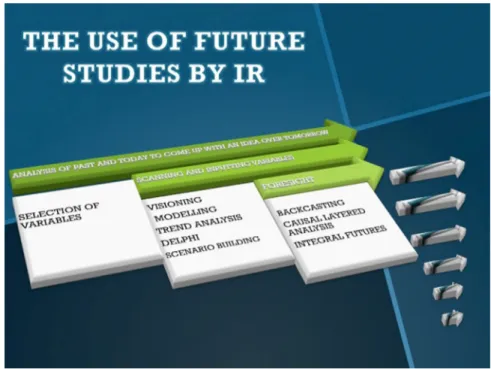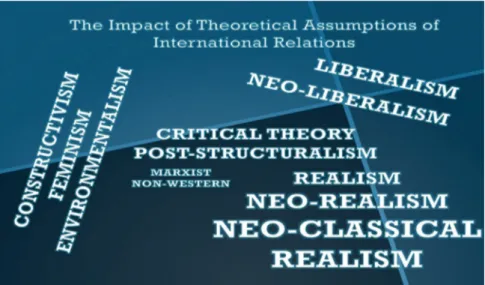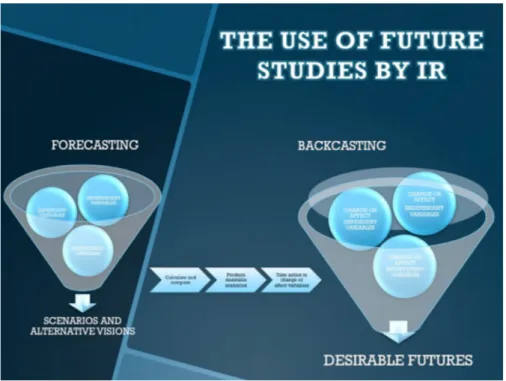The
state
of
future
in
international
relations
Mert
Bilgin
DepartmentofPoliticalScienceandInternationalRelations,IstanbulMedipolUniversity,Kavacık,Beykoz,Istanbul,Turkey
ARTICLE INFO
Articlehistory:
Received8December2015
Receivedinrevisedform11April2016 Accepted30May2016
Availableonline4July2016
Keywords: Theory Methodology Internationalrelations Futures Futuresstudies ABSTRACT
ThispaperelaboratesthestateofFutureinInternationalRelationsfromacomparative theoreticalperspectivewithregardtotheselectedmethodologicaltoolsofFuturesStudies. It,first,looksintothedevelopmentofInternationalRelationsandFuturesStudiestopoint out,howtheircontextual,conceptualandepistemologicalsimilaritiesanddissimilarities emergedinduecourse.It,then,analysestowhatextentthemethodologicaldifferences betweenselected Futures Studies techniques (e.g. forecasting, trend analysis,Delphi, backcasting,causallayered analysisand integralfuturesapproach)intersect withthe conceptualandnormativedifferencesbetweencontemporarytheoriesofInternational Relations stemming from Realism, Liberalism, Constructivism, Post-structuralism, Normative Theory and Critical Theory. The paper characterizes the relevant futures techniques with reference tothe theories of International Relations, and scrutinizes selectedfuturisticnarrativesofInternationalRelationsfromamethodologicalperspective. It,then,elaborateshowFuturesStudiesandInternationalRelationscanbenefitfromeach other’sstrengthsin termsoftheirmethodologiesand assumptions.Thearticlefinally explores to what extent the promises of Futures Studies techniques conjure up a convergencebetweendifferenttheoriesofInternationalRelations.
ã2016ElsevierLtd.Allrightsreserved.
1.Introduction
ThisarticleelaboratesthelinkbetweenInternationalRelations(IR)andFuturesStudies(FS)withtwomaingoals. First,andwithreferencetoIR,thepaperpointstoacontrastbetweentheuseoffuturetechniquesinpolicymaking processesofinternationalrelations,andtheverylimitedroleattributedtoFSbythetheoriesIR.Thegapbetweenpolicyand theoryaspectsofIRdeservesafurtherscrutinyastopointoutwhethertheuseofFStoolswithinIRmayencourageafurther compromisebetweenthetheoryandpractice,andconjureupaconvergenceamongthetheoriesofIR.
Second,and withreferencetoFS,it explorestowhat extendIRand FSpromisepractical and academiccommons. ContemporaryFSmethodologysupportstheuseofscientifictechniquesthatembracenormativeand/orempiricalcriteria. AndyetinstitutionalandpracticalexpansionofFSnecessitates“criticalconsiderationandfurtherengagementoftheories fromotherfields–aswellasbuildingupon–itsmethodologicaltoolsthroughfurtherconceptualization(Laurent,Fuller,&
vanderHelm,2009,69).”
IRandFSentailabroadinteractionintermsofthreeaspects:
First,thereappearsasimilarhistoricaltrackwithregardtotheprogresstheypavedaftertheWorldWarII.Theygradually became independent, confronted the atomistic structure of the ColdWar era, and benefitted frommultiplication of dependentandindependentvariablesthroughoutglobalization(Morgan,2014,8).Thereemergedadivergencebetweenthe
E-mailaddress:mertbilgin@medipol.edu.tr(M.Bilgin).
http://dx.doi.org/10.1016/j.futures.2016.05.011
0016-3287/ã2016ElsevierLtd.Allrightsreserved.
ContentslistsavailableatScienceDirect
Futures
expansionofIRasanacademicdisciplineandtheriseofFSasanacademicfield.Thetermdisciplinewouldimplythe presenceofconceptualandpropositionalstructure,skills,methods,attitudesandvalues,aswellastheirextensiveusefor universityandschoolunitsofteachingandresearch(Manzon,2011,14).Itsmaterialobject,phenomenaofstudy,orits practicalpursuitmaybetheunifyingepistemologicalelementofanacademicfield(Manzon,2011,19).FSstemsfromavery welldefinedmaterialobjectandphenomenaofstudyingfuturesconcerningitsacademicandpracticalpursuits.Inturn,FS emergedasanacademicfieldwithmethodologicalutilityandinnovativetechniques.Discretenessandautonomy,whichare becomingmoreapparentincaseofFS,areimportant;andyetanacademicdisciplinerequiresnotonlyasystematicbodyof theory,appropriatemethodology,andadistinctsubjectmatter,butalsoawidespreadexpansionatuniversitiesandother institutions.FSdidnotacquirethecharacteristicsofapopularacademicdiscipline,foratleastitsdevelopmentlackedthe institutionalexpansionaspect,sincethereareonlyfewinstitutionsthatteachandresearchFSattheuniversitylevel.FS existsasanidentifiablesphereofintellectualactivitythatofferspracticaltoolsandconcretewaystounderstandprobable anddesiredfuturesnotonlyforscholarsparticularlyinterestedinFS,butalsoforthoseinterestedindifferentareassuchas technology,business,society,economy,politics,historyandIR(Bell,1997).Itis,therefore,possibletoidentifyFSasan academicfieldthatcoversdistinctmethodology,originalconceptualizationsandinnovativetechniques.UnlikeFS,IRisnot onlyextensivelyinstitutionalized,butalsowidelyaccepted,andappearscapableofmeetingthesecriteriatoexistasan autonomousdiscipline(Puchala,2003,3).“Mostimportant,IRflourishesintellectuallyasaresultofhavingformulateda distinctandrecognizedbodyoftheorythatdescribesandexplainsphenomenaintherelationsofstatesandpeoplesthatare ofpreeminentinteresttostudentsofthediscipline”(Puchala,2003,8–9).
Second,FSconcernswithindividuals,societies,institutions,concepts,territoriesandspatialstructuresatsub-national, national,inter-nationalandsupra-nationallevels,alongwithrelevantstateandnon-stateactors(Fuller&Loogma,2009,
71–79;Glenn&Gordon,2009;Inayatullah,2014;Slaughter,2008).Wide-rangingchoiceofactorsandlevelsofanalysis
helpsFSadoptdiverseperspectivesinscrutinyoftheconcernedissues.Thisisanimportantmethodologicaladvantage becauseamyriadofFStechniquescanbeusedfromdifferentperspectives,andtheoreticalstances,atindividual,societal, institutional, territorial, conceptualandspatial levelsofanalyses. Onthe contrary,thechoiceof actorinIRdiscipline appearedasacomplicated,andacontroversial,theoreticalissuethatdeceleratedthelikelihoodofacommonconceptual compromiseofdifferenttheoreticalapproaches.TherearelingeringcontradictionsmainlybetweenvarioustypesofRealism
(Gilpin,1984;Mearsheimer,2001;Morgenthau,1948;Rose,1998;Waltz,1954),Liberalism(Keohane,1990;Nye,1988),
Constructivism (Katzenstein,1996; Wendt,1999, 2003), Critical Theory(Ashley,1984; Cox,1983; Linklater,1990)and alternatives.Thesetheoriesstemfromdifferentassumptionsonthetypeandnatureoftheactorsthatareassumedtobe effectiveininternationalrelations.Itis,however,possibletounderlinethatstartingfromthenation-state,thedisciplineof IRbroadeneditsscopeofanalysisbyembracingmoreactorsandtypesofrelationsatdifferentlevelsofanalysis(Alker,1996;
Alker,Gurr,&Rupesinghe,2001).Theincreasingquantityofactors,andthewebofrelationstheyconstruct,emergedin
conformitywiththetheoreticalenrichmentofthediscipline,fromarelationshipbetweenidealismandrealism,towardsa multilateralinteractioninbetweenidealism,realism,institutionalism,criticalapproachesandalternativetheories(Brecher
&Harvey,2005).“MoregenerallyIRdonatesinteractionsbetweenstate-basedactorsacrossstateboundaries,amongthema
varietyofnon-governmentalornon-stateactorsororganizations”(Lawson,2012,5).Today,bothIRandFSdealwitha varietyof actorsanda myriadofissues atsub-national, national,supra-national andtrans-national levelsofanalyses althoughthechoiceofactorsfromFSperspectiveprovesawiderdegreeofapplicabilitybeyondideologicalortheoretical odds.
Third,andthemostimportantlyforthemotiveofthisarticle,contemporaryIRandFSbenefitfromactors,conceptsand theorieswithsimilarfragmentationsintermsofthewaytheyprioritizefacts;conceivevariablesandproposehypotheses concerningissuesofinterest.ThedisciplineofIRdeviatesfromthefieldofFS,aswellasfrommanyothersciences,asitis muchmoreresponsivetochangingindependentandinterveningvariables,andyetwiththefewestpossiblechangesinbasic assumptions.Theoreticalperspectives,stemmingfromoriginalvariationsofRealism,Idealism,Liberalism,Constructivism, andtheiralternativepresuppositions,adapttochangingdynamics,andproveacertaindegreeofvalidity,dependingonthe characteristicsofthecaseanalyses.Ontheonehand,thisresponsivenessisusefulbecausetheoriesofIRcanbeconsideredas meanstobechosenfromatoolkit.Thisapproachhelpsindesigningmethodologicalframeworksatregionallevelofanalysis regardlessofthepeculiaritiesofthechosentopic.Ontheotherhand,thisresponsivenesscausesdifficultyofbuildinga reliablemethodologywhenitisaboutthefuturesingeneral;ortheevolutionofinternationalrelationsinparticular.Awider anddeeperuseofFStechniquesmayhelpIRrichenitsmethodologicaltoolkitandeaseideologicalortheoreticaloddsthat impedeaconceptualcompromiseonpolicymatters.
ThispaperacknowledgesthesignificanceofconventionalFStechniquesinstudyofinternationalrelationsandrefersto actualmethodologicalinnovationtoidentifythelikelihoodofreliableuseofFStoolswithinthedisciplineofIR.Thismutual potential doesnot mean that IRskipped FS thus far, and vice versa.FS scholars elaborated the courseof futuresin internationalrelationsfromconceptualandcritical(Morgan,2010;Sardar,1993,1997),aswellastrendanalysisperspectives
(Glenn&Gordon,2009).TheuseofFSwithinIR,however,indicatesidiosyncraticcharacteristics.Thereare,ofcourse,certain
IRinstitutionssuchas,butnotlimitedto,Rand,HudsonInstituteandStratfor,whichfrequentlyuseFStools,muchmorefrom foresightperspective,andproposealternativevisionsofthefuturesforthepurposeofpolicymaking(Andersson,2012,
1411–1430).Inthemeantime,IRscholars,fromwell-definedtheoreticalstances,proposedalternativefuturesintheir
analyses ofthefutureof internationalrelations (Fukuyama,1989; Huntington,1993;Mearsheimer,1990).Manypolicy makersofIRengagedinFSasinthecaseofBush,pioneeringtheBushDoctrine(Bush,2012)thatappearsasacaseof
backcastingbasedonaparticularforesight.Recentlyhavecertainscholars,withpolicyexperienceinmilitary,businessor diplomacy,adoptedFSmethodologyintheiranalysisofthefuturesasinthecaseoftheComplexityTheory(deB.Mills,2016). Theremaybe,andwillbe,otherexamplesthatshowhowscholars,policymakersandinstitutionsfromIRdisciplinecanuse differentfuturestechniquesforparticularconcerns.Andyet,thisarticlesuggeststhatthedisciplineofIRisinneedofFStools notonlytoconsolidatedataandcomeupwithdifferentscenariosonthefuturefrompolicyperspective,butalsotosustaina breakthroughinitstheoreticalandmethodologicaldevelopment.
Sotostateinparticular, policymakersandcertaintheoreticiansbenefitfromFStechniques suchastrend analysis, anticipatorysurveys, Delphi method, environmental scanning and forecasting. Nevertheless, this paper suggests that conventionalFStechniquesandrecentinnovationinCausalLayeredAnalysis(CLA),IntegralFuturesApproachandGlobal TrendAnalysisintersectwithactualdevelopmentsnotonlyinexpandingthescopeofanalysiswhilepolicymaking,butalso withreferencetotheoriesofIR.Hence,thispaperpointstothegeneralrolethatmaybeplayedbythemethodologicaltoolsof FS,andtheparticularsignificanceofselectedtechniquessuchasforecasting,backcasting,DelphiandCLAconcerningthe policyandtheoryaspectsofIR.
Followingaconceptualanalysis,thearticleelaborateshowFSandIRcanbenefitfromeachother’sstrengthsintermsof methodologyandassumptions,and discussestowhatextentthepromises ofFStechniquesconjure upaconvergence betweendifferentapproachesofIR.
Thesecondsection,followingthisintroduction,underthetitle“ConceptualandinstitutionaltracksofIRandFS”makesa summaryofthehistoricaltracksofIRandFSwithaparticularfocusontheirdevelopmentaftertheWorldWarII.
Thethirdsection,underthetitle“Theory,futuretechniquesandthestudyofIR,”looksintotheconceptualandtheoretical enrichmentofthetheoriesofIRandFSwithregardtotheirsimilaritiesanddissimilaritiesconcerningtheselectedcases.It elaboratesrelevanceofselectedFStechniques(foresight,Delphi,backcastingandCLAinparticular)withregardtoselected theories of IR originating from Realism, Liberalism, Marxism, Post-Structuralism, Normative Theory, Constructivism, FeminismandCriticalTheory.
Thefourthsectionunderthetitle“Dotheoreticaldifferencesreallymatterinanalysisofthefuture(s)?”elaboratestowhat extentitmaybepossibletoeasemethodologicalandtheoreticaloddswhenitisaboutoutlayinganddesigningmultiple futuresfromIRperspective.Itelaboratesthemostknownfuturisticnarrativesthathavebeendevelopedandproposedfrom thetheoreticalperspectiveofIRasinthecasesof“Socialism”,“Capitalism”,“Backtothefuture”,“Theendofhistory”and “ClashofCivilizations.”
“Conclusion”bringsoutthewayIRdisciplinecanbuilduponitsmethodologicalstructuresbybenefittingfromFStools; anddiscussestowhatextenttheproposedinteractionbetweenIRandFSpromisefurtheracademicgainsintermsoftheory andpractice.
2.ConceptualandinstitutionaltracksofIRandFS
Internationalrelationsstartedthousandsofyearsago.TherelationsbetweenSumeriancity-states(3500BCE)appearas aclassicalexampletobegivensincetheyincludedwar,peace,trade,transitandtransportation(Westenholz,2002,23– 42).PoliticalwrittenhistoryofinternationalrelationscanbetracedbackuptoThucydidesnarratingtheconditionsofwar and peacein Hellenisticcultures(Price,2004, 7–11).Itis, however,necessarytodifferentiateinternationalrelations representingtheconditionofpeace,conflictorwarinbetweensocieties(representedbyanauthority),fromtheacademic disciplineofIRthattheorizes,studiesandappliesfindingsvis-à-visconcernedactors.Despitelonghistoryofinternational relations,theacademicdisciplineofIRisquitenew.ThefirstChairinIR(theWoodrowWilsonChair)wasestablishedin 1919attheUniversityCollegeofWales(AberystwythUniversity)“symbolizingtheoptimismandbravenewworldidealism oftheimmediatepostwarperiodfocusedonthecreationofnewLeagueofNationsattheParisPeaceConferencein1919”
(Morgan, 2014, 8). Since then, IRturned intoone of the most studiedfield by leading toa widespread institutional
expansion.
Similarly,“lookingintothefuture”provestobeanimportantpartofthehumanhistory,butthesystematicandscientific studyoffuturesisarecentbreakthrough.Itisofcoursepossibletotalkabouttheuseoftechniquesatindividualandsocietal levelintermsofearlyversionsofforesight.Futuristictechniquescanbetracedbackinhistorywiththeveryfirstcoin describing a desirable or undesirablepicture of futuresincluding inter-religious identifications, suchas depictionsof SumerianGoddesses,datingbackthousandsofyearsuptothefirstvisionarydescriptionsofdesirableorundesirablefutures. PoliticalvisionsofSumerianorHellenisticcity-states,theirconflictsandcooperation;thepeaceandwarperiodstheylooked forcannotbedetachedfromtheveryearlyuseofFStechniquestocharacterizeactualconditions,identifytrendsandtake pro-activemeasurestoaffect,shapeorchangethecourseofhistory.
UnlikeIR,FSstudiesinheritedaconceptualcomplexitybecausetheearlyacademicuseofthenotiondifferedfromits latterconnotationsandconceptualizations.ThecontextualessenceofIRremaineditsquintessencesincetheearlyuseofthe term international relations referred to relations between groups, societies, nations and other societal structures representedby,thepresenceorabsenceof,anauthority.Onthecontrary,historicalconnotationsofthetermsthatdescribe futuresmaybeblurringincertaincases.Forinstance,utopianismandfuturismdeserveabriefconceptualelaborationin ordertoindicatewhytheyshouldnotbemisidentifiedwithcontemporaryFS.TheveryfirstconceptualizationofUtopiaby ThomasMore(Utopia,originallypublishedin1516)appearsasagoodfuturisticexamplethatdescribesafictionalsociety prosperingasIslandintheAtlanticOcean(More,1737).Utopianismemergesasultimateidealismwhereinidealismgoesfar
beyondtheconnotationinIRbyembracingfiction,orrevealinganassumedbreakthroughthatisnotexpectedinforeseen future.IdealisminIRismuchmorepolicyorientedandreferstoachievablegoalswithreferencetodefinednormsand criteria,andsometimesappearsastheoriginalarchetypeofmodernliberalism.
It is alsonecessary todifferentiatecontemporary FSfromthe primordialuseof methodology aswell as fromthe phenomenonofFuturism.Thelatterwasintroducedasaperspectiveinpoetryandthengainedpopularitythroughout differentcountriesincludingEurope,AmericaandJapanafterbeingattributedanewconnotationembracingsocial,political, economicandtechnologicalaspects(Perloff,2012:9).Tostartfromthebeginning,FilippoTommasoMarinetti’sFoundation andManifestoofFuturism(LeFigaro,February1909)introducedandlabeledFuturism“notonlyanartisticbutalsoasocial andpoliticalforceofinnovation”(Berghaus,1996,47).Today,itispossibletotalkaboutasharpdifferencebetweentheterm FuturismandFSwherethelatterfocusesonnormative,epistemologicalandpositivistanalysisoftrendsandpossibilitiesof futuresincontrasttothefirstwhichcombinesaesthetic,politicalandsocialinnovationtosustainonedesirablecourseof history(Poggi,2009).Inshort,FuturismnecessarilyreferstopreferredimagesofthefutureasDatorstates:“FSisinterested notinitselffurtheringanyparticularviewofthefuture,butratherinfurtheringbothnarrowlyprofessionalaswellasbroadly participativeinquiryintothefuture;understandingtherootsandconsequencesofeachofthemanifoldimagesofthefuture thatexistinpeople’smindsandinsupportofpeople’sactions”(Dator,2002,7).
The end of the World War 2 accelerated not only the study of FS from scientific perspective but also the development ofIRas anindependentdiscipline.To startfromthesecond, theconceptandcontingencyofWar,and thereforeRealisttheory,extensivelydominatedtheacademiaandpolicymakingprocessesuntillate1960s.“The1960s and 1970s werecharacterized by therise of different perspectives ofIR: “1-The‘arch realism’ ofChurchill, Kennan, MorgenthauandNiebuhr;2-The‘neo-realism’ofWaltz;3-Decisionmakingapproaches;4-SystemsApproaches 5-Self-reliance models for development; 6-Revolutionary Anti-Imperialist Theories; 7-Non-taxonomical arguments of National Security Council 68; 8-Behavioral Approaches; and, 9-Ecological Approaches.” (Knutsen,1997, 257).1970s were characterized by normative and conceptual counter arguments challenging Realism. Theories of IR enriched throughout 1980s and 1990s with alternative arguments from the perspectives of Liberalism, Neo-liberalism, Constructivism,FeminismandEnvironmentalisminpartialresponsetotheissuesdeliveredbyglobalizationand post-modernization after the demise of Socialism. Normative and Critical Approaches, in the mean time, became more concerned with conceptual aspectsof IR.
Historical developmentof FS entailedphases that correspondedto its methodologicaland conceptualprogress at individual,institutionalandorganizationallevels(Son,2015,120).WithinasimilarhistoricaltracktothatofIR’s;FSturned intoawell-definedscientificfieldwithoriginalconcepts,theoriesandmethodologiesfollowingtheendoftheWorldWarII. Systemanalysis,withinthisphase,wouldbeinfluentialtodevelopandexpandFStoolstoabroaderspectrumfromcentral planningtoinstitutions,governments,statesandsocieties.Kahn(1962,1965)wouldleadnotonlytheestablishmentof Hudson Institute, but alsotailoran early appearanceof FS as we understandnowadays (Kahn& Wiener,1967). The establishmentofRANDin1946,TheSocietyforGeneralSystemsResearchatStanfordin1955(ISSSsince1988),Association InternationaledeFuturibles(byBertranddeJouvenelandHelenedeJouvenel)in1960,WFSin1966,WFSSin1967,Yale CollegiumontheFuture(byHaroldLasswellandWendellBell)in1967,TheClubofRome(byAurelioPecceiandAlexander King)in1968,theInstituteforAlternativeFutures(byClementBezold,JamesDator,andAlvinToffler)in1977,TheSantaFe Institutein1984wouldbereferredastheinstitutionalmillstonesofFS(Anderson,2016).
FSaccelerateditsinstitutionalexpansionandinternationalizationattheuniversitylevelstartinginearly1970s.FSatthe UniversityofHouston-ClearLake(establishedin1971),HawaiiResearchCenterforFSattheUniversityofHawaiiatManoa (1971),InstituteforFuturesResearch(IFR)attheUniversityofStellenbosch(1974),DepartmentofFSattheUniversityof Kerala(1990),FinlandFuturesResearchCentreatUniversityofTurku(1992),RegentUniversityMAinStrategicForesight (1996),AustralianForesightInstituteatSwinburneUniversityofTechnology(1999),TheGraduateInstituteofFSatTamkang University(2002)andTheFuturesAcademyatDublinInstituteofTechnology(2003)canbenamedasthemostpioneering universityinstitutionsspecializedatteachingandresearchofFSinduecourse.
Although theinstitutions, which primarily teach and research FS, have been increasingsince 1970s, the current pictureisfarbehindthenumberofIRdepartmentsandcenters.UnlikeIR,itispossibletotalkaboutaninconformity betweenmethodologicalandtechnicaldevelopmentofFS,whichgainedittheprivilegesofanacademicfield,andits relativelylowlevelofinstitutionalexpansionthatdidnotallowitflourishasanindependentdiscipline.Thisgap,first ofall,arises astheconsequenceofthemethodologicalapplicabilityofFStoolstoawide-rangingareathatembraces business,states, governments,organizations,individuals, societies,groups and otherinstitutionsand structures.The methodological applicability,and relevant innovations,gainedFSpopularity, andyet,decelerated its institutionaliza-tionasadiscipline.Onthecontrary,thetheoreticalandmethodologicalscopeofIRisrelativelylimited,incomparison toFS,withinits owndiscipline.Only veryrarelywould aneconomist,manager,sociologist,environmentalist,orany otherindividualfromanyotherdiscipline,benefitfromthetheoreticaldebateofIRtosupportreliabilityofaresearch or facilitateteachingoutofIR.FSfromthisperspectiveemergesasamulti ortrans-disciplinaryfieldwithextensive applicability toother disciplines.
3.Theory,futuretechniquesandthestudyofIR
Sinceforesightiscompatiblewithstrategicthinking,themethodprovesagreatdealofharmonywithdecision-makingor policy-makingprocessesinIR.“Theroleofdecisionmakinganddecisionmakersisavitallyimportantfactorinforesightand futuresthinking,ascriticalpolicydecisionsoftenproveessentialinmovingtowardfuturegoals”(Godet&Mack,2011,74). Thoroughforesighthelpsinproactivestrategiesthatmaketheconcernedactorsbecomereadyforfuturechangesbeforethey happen,achievedesirablefuturesoravoidtheundesirableones.
TheuseofforesightinIRgainedstrategicsignificance,sincetheverybeginningoftheriseofRealism,astoconsolidate gains,andminimizelosses.ForesightandbackcastingfromaNeo-realistperspectivewoulddifferfromthisconnotationas wellasotherusesofFSwithreferencetootherIRtheories.ANeo-realistperspectivewouldbeinterestedinforesightto forecastrelativedifferencesingains andlosses,withindifferentscenarioscomprisingdifferenttypesofconflict.Soto exemplify;oneoftheactorsmaybeinterestedinlesscooperationwithotheractor,oractors,anddecidetoconfrontabsolute short-termlosses,iftheexpectedgainsarerelative,andfavorthepowerof“theOther”inthelongrun.Inthiscase,the concernedactorswouldbeinterestedintrendanalysis,emergingissuesanalysis,crossimpactanalysis,forecasting,Delphi methodandscenariobuildingtoindicatetheextentandtypeofcooperationwithsimilarrelativegains,andthethreshold pointwhichisexpectedtoresultinagrowingdifferencebetweenthegainsoftheactors.ALiberalorNeo-liberalperspective wouldconveytheuseofsimilarFStechniqueswhenitisaboutidentifyingpossibilitiesaboutthemutualgains,losses,risks, threatsandopportunities.SincethechoiceofactorstobemadefromLiberalorNeo-liberalperspectiveswouldimplya broaderselection;gainsandlosseswouldgobeyondState’slong-termgoals,aspresumedinRealistandneo-Realisttheories, withtheassumption that cooperation betweenindividuals, groups, firms and organizationswould ease thenegative connotationoftherelativeorabsolutegainsbydecreasingthecontingencyofconflictorWar,onbehalfofcooperation varyingfromtradetoneo-functionalintegration.
Someforesightanalyses fromtheperspective ofRealism and neo-Realism,(Huntington,1993;Mearsheimer,1990) employFStools,andyetacknowledgetheclashofinterestsandvestedinterestsoftheStatesasofutmostsignificance regardless of thesociallyconstructiveprocesses that arethoughttobe ofless interest; withthe partial exceptionof neo-ClassicalRealism(Rose,1998).FSstudiesfromliberalandneo-liberalperspectivesadoptforesighttocomeupwith visionsoffuturesasinthecaseofFukuyama(1989,1992).ScholarscombiningthepremisesofFSwithpoliticalprocesses wouldpointouthowtheoutcomesofforesightmethodologycarriesoutsociallyconstructedprocessesthatarehighlylinked tothelegitimacyofthesocialgood(Fuller&Loogma,2009,71–79).Thisperspectivewouldfitboththebasicpremisesof Constructivism(Wendt1999,2003)andCriticalTheoryofIR(Ashley,1984;Linklater,1990)sinceeachsociallyconstructed processwouldembednotonlyrelationsofwealthbutalsohegemonicpower(Cox,1983)indicatingthecorrelationbetween thedesiredfuturesofdifferentactorsandthewayhowhegemonicrelationsaresupported,orbeingchallenged,tosustain presenttimefactswithvisionsoffutures.FeministtheoryofIR,stemmingfrompostmodernism,identifiesgivensexualroles intermsofbeinglegitimizersofactualmasculinehegemonyfromasimilarperspective(Sylvester,2002).Foresightfrom FeministPerspectiveusesFStoolstodrawthefuturesstemmingfromthemasculinityofactor-object-subjectrelationshipof Realismandneo-Realism(Runyan&Peterson,1991,67–106).
Epistemologically,thereexistimportantcommonpointsbetweenpost-structural(derDerian,2009)andpost-colonial
(Chowdhry&Nair,2004)theoriesofIRontheonehand,certainFSscholarswhopointouthowactualuseofFSsupport
dominantWesternstructuresatthedetrimentofdisadvantagedregions,religionsandmarginalizedgroups,ontheother
(Collier &Fuller,2005,111–116;Sardar,1993,1997).Whilediscourse theorizingin IRcrosses overandmixesdivisions
betweenpoststructuralists,postmodernistsandsomefeministsandsomesocialconstructivists(Milliken,1999,225–254), CLAmovedonfromtheideaofdiscourseanalysisasittookplacewithintheIRtheory,andtransformedtextualstructural scrutinyintofutureorientedstructuralanalysisofinstitutionalandnarrativelayerstofindoutoriginsofundesirabletracks offutures toresolvethem (Inayatullah,2009, 2014).IntegralFutures Approach,in themean time, adopteda holistic perspective,closetonormativeapproachofIR(Brown,1992),andembracedintersectionsbetweenthesubjectivefactorsat theindividuallevelandtheobjectiveonesatthecontextuallevel(Slaughter,2008).Themainideawas toanalyzethe processesand outcomesof thereciprocitiesbetweentheSelf andthe environmentcomprising ofstructural, cultural, conceptualandsocialfactorstoidentifyandeaseobstructiveflawstowardsabetterfuture(Slaughter,2008).
FS,therefore,considersIRasafieldofanalysisforwhichamyriadoftheoreticalperspectives,conceptualizationsand techniquesmaybefunctional.IR, scholarsorpolicy-makers,benefit fromFStechniquesnotprimarilyfromtheoretical perspective,butfrompolicyperspectiveconcerningthegoalsofaninitiative.Thereis,indeed,ahugegapbetweenhowthe theoriesofIRreferanduseconceptualandmethodologicaloutputsofFS,andthewayIRscholarsandpolicy-makersbenefit fromcertainFStechniques.
Animportantreason,whichmayelucidatethebackgroundofthisgap,comprisesofepistemologicalcharacteristicsofthe knowledgein FS.ContemporaryFSindispensablybenefitsfromforecasts,scenarios, expertopinions,visionsandother methodologicaltools.“Forecastsandvisionsarethemselvesepistemologicalactivities–inthesensethattheyarebasedon sometheoryof knowledge– but theydo not yield knowledge ofthe future itself. Allthey do is toprovide uswith manufacturedknowledgeofrestrictednumberofpossibilities(Sardar,2010,178).ThepolicyaspectofIRbenefitsfromthe fabricatedknowledgeofthefutures.IRtheories,inthemeantime,benefitfromconceptualization,particularizationand generalizationbyusingtheknowledgeofpastandtodayasinputvariablesthatareexpectedtobesuitableforteachingand research.Thegapbetweenpolicyandtheory,intermsofthewaytheyemployFS,makesIRdeviatefromotherdisciplines
thatprovemoretheoreticalrelevancetoanalysisoffutures.Thisiswhyitmaybepossibletopointoutthatthedistance betweenIRpoliciesandFStoolsismuchcloserthantheonebetweenIRtheoriesandepistemologicalFS.Thischaracteristic canbeconsideredasoneofthemainreasonsthatresultinthecontroversialgapbetweenrhetoricalIRtheories,which remaindistantfromthetheoreticaldevelopmentofFS,andactualIRpoliciesthatfrequentlybenefitfromFStoolssuchas foresight,scenariobuildingandbackcasting.
Sotoexemplify;Delphimethod,whichwasextensivelyusedbyRandCorporationstartingin1970s,dependsonthe consensusoralternativevisionsofexpertsobtainedoutofaninteractivemeetingtoproposeacommon(oralternatives) foresightona particularissueortopic.ThesuccessofDelphi inIRreliesonforesight,and itdeviatesfrompositivist foresightbecauseitincludesexpertopinionsandexpertdiscussionasacoefficientthatisexpectedtominimizetheriskof uncertainorunexpectedindependentorinterveningvariables.Delphiappearsasafrequentlyusedtechniqueespeciallyin policy-makingprocessesof IRwithregardtoshort,mediumandlongterms.Incases,whicharesupportedbyexpert competence,reliabilityandvisionary thinking,theDelphimethodmayleadto,orbuildupon,scenariosorvisions.In certaincasestangibleresultsofforesightmaybecomemoreprecisewithsupportfromDelphi.Inothercases,theoutcome ofDelphimaynecessitatetheuseofFStechniquesbasedontangiblevariables.StrategicThinkThanksspecializedatIR, diplomaticworkinggroupsandpractitionersadoptthiskindofapproachandextensivelyuseDelphiasameansofpolicy building(Graphic1).
CLAandIntegralFuturesApproachdeviatefromotherfuturestechniquesfortheirnormativeclosenesstoalternative theoriesofIRsuchasConstructivism,DiscourseAnalysisandPost-Structuralism.CLAappearsasanewtechniquetocope withthecomplexityofissuesingivencasesbydeepeningtheanalysisstructurallytocomeupwithaclearinsightonthe real causes and barriers of an undesirable situation or problem from different perspectives andat multiple levels
(Inayatullah, 2009, 2014).Itmayresult in theneed for changeby dominantactors involved in theprocess.Butnot
necessarily, because it goes in a deeper structural analysis and transcends involved actors, processes, norms and principles.Itthenidentifiesproblems.Withinthisperspective,normativeissuesofIRtheoriesmaybeconceived‘asthey are’withreferencetowhatextenttheycontributetoproblemsolving.ImportanttheoreticaldifferencesofIRonthechoice ofdominantactors,vestedinterests,rationalorirrationalbehaviors,Wildcards(ForceMajeureinIRlanguage),positive andnegativeexternalities,absoluteandrelativegainsaretreatednotfromatheoreticalperspectiveasunderstoodinIR; butsimplyasobstaclesandincentivesofpossiblesolutions.Withinthissense,CLApromisesanextensiveadaptabilityto thestudyofIR(Table1).
TheuseoftheseandotherFStechniquesarecommoninthefieldofIRmuchmorefrompolicyperspective.Whatabout thelinkbetweenpractice,methodologyand theory?In otherwords howwoulddifferencesbetweenthesetechniques convergewithconceptual,assumptiveandhypotheticaldifferencesbetweenthetheoriesofIR?Sotoexemplify;therewould appearquitedifferencesdependingonthechoiceofactors,processesandissuesbetweenRealismandNeo-realismonthe
Graphic1.ForesightMethodologyandInternationalRelations. Source:Illustratedbytheauthor.
onehand,LiberalismanddiversetypesofNeo-liberalismontheother.ARealistperspectivewouldprioritizethevariables thatareexpectedtogiveideasaboutabsoluteshiftsinmilitary,economicandtechnologicalpowersofselectedcountries withaspecialfocusontheStates.ScenariosondifferentconditionsdescribingthestateofWarandPeacewouldbepopular becausetheyareexpectedtohelptheconcernedactorstakerelevantmeasuresbefore“itistoolate.”
For example, the preemptive strike doctrines of 1945 and 2011 (which was proposed by President Bush in 2011published andin 2012),looklike eachotheras theybothlegitimizedthe useofmassive forceagainstdefined potentialthreatswhichwereexpectedtodrasticallyaffectthecourseofhistory,hadnochangeoccurred(Maszka,2014, 27–28).BothofthedoctrineswouldrepresentclassicalcasestobeinterpretedwithinthebasicassumptionsofRealist theory of IR. There would, however, emerge important differences between them from comparative IR theories perspective.Thetypeoftheactorsinvolvedinaction,changesinlegitimizationprocessesandprovokingcircumstances, masculinecharacteristicsofwarpropaganda,correlationbetweentheuseofforceandpublicopinion,canbenamedasof utmost significance for IR study, particularly for Post-structuralism, Constructivism, Feminism, Critical Theory and NormativeTheory.FS,inthemeantime,wouldidentifytheprocessofpolicy-makingfromanotherangle.Accordingly,the conceptofpre-emptivestrikedoctrine,forinstance,wouldbeconsideredasanoutcomeofforecastingstudy,supportedby Delphimethod,whichresultedinasortofbackcastingbylegitimizingtheuseofforcetoattainadesirablefutureandavoid theundesirableones.Fromthissight,thebombingofHiroshimaandNagasakiinAugust1945wouldbeconceivedas preemptivestrikesthathadbeen legitimizedbyundesirablescenarios obtainedfromforecasting andDelphi. Atomic bombswereconsideredtobetheinterveningvariables(WildCards)tochangethecourseofhistorytowardsadesirable track,assumedtobecompatiblewiththevisionthathadalreadybeenobtainedoutofbackcasting.Similarperspective wouldarguethattheBushdoctrinelegitimizedpreemptivestrikewithreferencetotheurgentneedforsuchabackcasting thatappealedtheuseofforceastheinterveningvariable.
4.Dotheoreticaldifferencesreallymatterinanalysisofthefuture(s)?
TheoreticalpremisesofIRandpolicyorientedmethodologicaltoolsofFSresultinanidiosyncraticcharacteristicsofaras theyintersectwitheachotherforpolicyorstrategybuildingpurposes.DifferenttheoreticalperspectivesofIRrefertosimilar mechanicaluseofFStechniques,althoughwithconflictingandcontradictorymetanarrativesaboutthecourseofhistory
(Lyotard,1984).Thisdoesnotsimplyarisefromthehistoricaltrackstheyshare;nordoesitsolelystemfromasimple
polarizationbetweennormativeandpositivistapproachesasgenerallyarguedwithinthedisciplineofIR.Contextualand normative features affect the motives to use FS for different purposes in IR. This is for sure. There is, however, a methodologicalaspect,whichdeservesacloserlooksincethetechnicalfeaturesmaybeencouragingtheuseofthesame mechanismfordifferentpurposes,bydifferentactors,andwithdifferentassumptionsandexpectations,allexplicablewith referencetodiversetheoriesofIR(Graphic2).
Tostart from thefirst; thecontextdefinitely plays animportant role. Forinstance, contextualideology playedan importantroleintheuseofFSbyIRintheaftermathoftheWorldWarII.FromIRperspective,systemicdichotomiesbetween CapitalismandSocialismmadeagreatdealofsensewhileanalyzingissuesofthisera.Theroleplayedbyideologyisalso noteworthyfromFSperspective.Marxismappearsasagoodcaseforbothofthedisciplines.FromIRperspective,Marxism ledtoanimpactwithintheinternationalsystembydifferentiatingSocialisteconomiesfromtheCapitalistones.Thesystemic characteristicswouldbehighlylinkedtothecapacitybuildingpotentialandstrategymakingabilityofthesetwopoles.In turn,actorsfrombothpolesusedFStechniquestoattaincompetitiveadvantage.FromFSperspective;therewouldappeara differentexplanationandanimplicitcritique.Accordingly,itwouldbearguedthatcontextualideologycausedtwolinear constitutiveoutsidehistories,headinginparallel.Theytriedtochangetheotherwithfewpossiblecounterinfluences.They, Table1
TheoriesofIRandFuturesMethodology.
Theory Future Narrative Relevance
Realism Linear Metanarrative Foresight(H)Delphi(H)
Backcasting(H)CLA(L)
Liberalism Linear/Non-linear Metanarrative Foresight(H)Delphi(H)
Backcasting(H)CLA(M)
Marxism Linear Metanarrative Foresight(H)Delphi(H)
Backcasting(H)CLA(M)
Post-Structuralism Non-linear/Multiple Microandmacro-narrative Foresight(M)Delphi(H)
Backcasting(L)CLA(H)
NormativeTheory Non-linear/Multiple Microandmacro-narrative Foresight(M)Delphi(H)
Backcasting(M)CLA(H)
Constructivism Non-linear/Multiple Microandmacro-narrative Foresight(H)Delphi(H)
Backcasting(H)CLA(H)
Feminism Non-linear/Multiple Microandmacro-narrative Foresight(H)Delphi(H)
Backcasting(H)CLA(H)
CriticalTheory Non-linear/Multiple Microandmacro-narrative Foresight(M)Delphi(H)
Backcasting(M)CLA(H)
*
unexpectedly,engagedingrowingsystemicinteractionbecauseeachofthemovewasnotaboutthecommonfutures,but ratheranoutcomeofassumptions(mostofwhichwereobtainedthroughtrendanalysis,forecasting,scenariobuildingand Delphimethod)overthecontingentaffectoftheothertrack(Table2).
WithinthetheoreticalstanceofIR;thedemiseoftheSocialistBlockcanbeinterpretedasthevictoryofCapitalism, democracyandtheconceptofopensociety.ThisIRbasedinterpretationled,indeed,tonewtheoriesandvisionsoverfuture asincaseofFukuyama’sargumentationmuchmorefromacontroversialliberalperspective(Fukuyama, 1989, 1992).TheEnd ofHistorynormativelyuniversalizedWesterntypeofdemocracyastheultimatedestinationtowardpost-ideologicalfuture. From“IR” perspective; theconditions allowingtheconceptof the Endof Historywould identifya newcontextwith additionalactorsandprocessestryingtoinfluenceothersandthesystem.
Manyscholars,asmentionedintheprevioussection,fromNeo-realist,Neo-classicalrealist,Neo-liberal,Constructivist, FeministandEnvironmentalperspectiveswouldcriticizeFukuyama’sunderstandingofalinearfuture,basedonWestern universalism.Thesecritiqueswerenotonlybasedonnormativedifferencesbetweentheoreticalstances.Theywerealso about themultitude of uncertainties that wereexpected todecelerate therise of Western idealism,or theidealistic descriptionoftheWesternuniversalism,overalternativescenarios.
Mearsheimer’s BacktotheFuture(Mearsheimer,1990)adoptedacombinationofclassical,structural,defensiveand offensiveRealismwhileexplainingFuturescenariosandpossibilitiesatthebeginningof1990s.Mearsheimeracknowledged the ideologicalconflict, materialproblems, thenon-existence ofan internationalsuperior authority and theanarchic environmentinwhichthestateswereseekingtosurviveasthebasiccharacteristicsofthe1990s.Hesuggestedthattheend oftheColdWarwouldresultinmultilateralbalanceofpowerwhichhadcharacterizedtheinternationalsystemfromthe 17thCenturyto1945.Havingdefinedcontextualcharacteristicswithreferencetopastandpresentfromatrendanalysis
Graphic2.Ideology,TheoryandInternationalRelations. Source:Illustratedbytheauthor.
Table2
FuturisticNarrativesfromIRPerspective.
Narrative Author
Future Ideology Methodology
Socialism Various
Linear High Foresight,Backcasting
Capitalism Various
Linear High Foresight,Backcasting
Backtothefuture Mearsheimer
Non-linear Moderate Foresight,ExpertOpinion,ScenarioBuilding
Theendofhistory Fukuyama
Linear High Foresight,Backcasting
Clashofcivilizations Huntington
Linear High Foresight,Backcasting
Globalhomogenization Various
Linear High Foresight,Delphi,Backcasting
Globalheterogenization Various
Non-linear/Multiple High/Moderate Foresight,Delphi,Backcasting,CLA
perspective,Mearsheimer’sBacktotheFuturewouldthenputforwardfourscenariosoffutures,stemmingfromthefeatures andcontingentprioritiesoftheconcernedactors(mainlytheStates).
Mearsheimer’strend analysisand contextualizationcanbefoundsoundfromIRTheoriesperspective,althoughhis assumptionsontheStates(asthemostimportantactors),motives(State’ssurvival)andthecontext(anarchicalenvironment oftheinternational system)appear vulnerabletocritiquesfromLiberal,Constructivist,Feminist,Post-Structuralistand Criticalperspectives. FromFSPerspective;therewouldemergeotherissues worthyofdiscussion.Firstofall,although Mearsheimer’sBacktotheFutureisaboutforesightbasedontrendanalysis,forecastingandscenariobuilding;thearticle doesnotmentionthesetoolswithinitsmethodology,noristhereanyreferencetoFS.Thedominantvisionbroughtoutby thearticleevokesalinearunderstandingofhistorydespitethefactthatthecontentappearsasanon-linearreadingofthe futuressinceitdevelopsfourscenariosandreferstoalternativepredictionsofthefutureunderthetitle“AlternativeTheories thatPredictPeace.”
Huntington’sClashofCivilizations(Huntington,1993)madearemarkableinfluencebydescribingthestateofnatureat thetimefromnormativeperspective.Thetheory,fromalinearunderstanding,wouldsuggestthatideologicalandeconomic concernswouldnotbetheprimarysourceofconflictinthefuture.Culturaldifferences,onthecontrary,wouldprevailasthe mainsourceofconflictbyresultinginconflictsofglobalpoliticsmainlybetweennationsandgroupsofdifferentcivilizations. Hewouldevensuggest,“Thefaultlinesbetweencivilizationswillbethebattlelinesofthefuture”(Huntington,1993,22). Huntington’schoiceofactor(“nation-stateswillcontinuetobethemainactors,”andhisbasicassumptionontheconflict basednatureofrelationsbetweendifferentcultures)woulddefinitelyprovemoreconformitywithRealistandNeo-realist TheoriesofIRthanConstructivism,Post-Structuralism,Feminism,NormativeandCriticalTheorysotogiveexamples.
Havingacknowledgedthesignificanceofthecontextandtheinteractionbetweennormativeandpositivistapproaches,it maynowbeusefultoelaboratethemethodologicalpromisesofFSthatfacilitatedtheuseofsimilartechniqueswithin contradictoryvisions.Mechanicaluseofvariableswouldrarelychangeaccordingtotheaims,ideologicalconcernsorvested interestsoftherelevantactorshadtheysharedacommonvision.AnongoingdebatewithinFSwouldcriticizethisawkward situationfromtheoreticalperspective(Morgan,2009,2010).Accordingly,theuseoftrendanalysisisthemostcommonway ofidentifyingwheretheconcernedactors,factorsorissueshavebeenheading.
ThereemergesanimportantproblematicthatisuniquetotheuseofFStechniquesinIR.Amethodologicalflaw,indeed, emergesasanoutcomeoftheinter-connectednessbetweenforesightandbackcastingincaseofIR.Toidentifystep-by-step: theoretical,ideological,contextualornormativedifferenceswouldmakelesssenseattheveryfirststepinwhichamyriadof variablesareusedasinputstocomeupwithaclearforesight.Theoretical,ideological,contextualornormativedifferences playefficientrolesatthesecondstepinwhichprioritiesaredefined.Differences,however,becomehighlyefficientatthe thirdstep,iftheconcernedactorsengageinbackcastingtoattainthemostdesirablescenarioproducedwithreferenceto particularneeds,fears,desiresandaimsofcertainactors(Graphic3).
Graphic3.ForecastingandBackcastinginIR. Source:Illustratedbytheauthor.
Thismechanicaluseofforesight,scenariobuildingandbackcastingfromIRpolicyperspective,fundamentallydeviates from the use within FS that would primarilybe concerned with the proper inputof the variables and the applied methodology.Ideologicaldifferences,vestedinterestsandthetypeoftheprimaryactorsofpolicy-makingprocesseswould bemoreinfluentialfromIRperspective.Accordingly,foresight,scenariobuildingandbackcastingfromIRpolicyperspective canbepracticallyadoptedbyamyriadofactorswithdifferentmotivesandinterests.Inthiscase,contradictionsarelikelyto arisenotonlyfromactualmaterialornormativedifferencesrelatedtowellbeingandidentity,butalsofromconcernsover thefuture.Hereappearsaquestionthatdeservesfurtherelaboration:docurrentclashesemergeassimpleoutcomesof materialdifferencesoridentityconflicts;ordotheycomeintolifeaspoliciesstemmingfromtheincompatibilitybetween thebackastingsoftheconcernedactors.Ifthesecondisthecase,asthisarticleargues,thisindicatesthatIRisinneedofa broaderanddeeperuseofFSmethodologybeyondthemechanicaluseofforesight,scenariobuildingandbackcasting. 5.Conclusion
This paper designated historical, conceptualand theoretical similarities and dissimilarities betweenIR and FS. It, furthermore,elaboratedtheconnotationanduseofFStechniqueswithinthepolicyandtheoryaspectsofIR.
TheoreticalperspectivesofIRadaptthemselvestochangingcontextualparametersandsustainvaliditywithdifferent degreeofapplicabilitydependingonthecharacteristicsofthecaseanalyses.Thisresponsivenessprovedtobeusefulbecause itallowedacorrelationbetweenvarioustheoriesofIR.However,thesameresponsivenesscausedthedifficultyofbuildinga reliablemethodologywhenitwas aboutunderstandingthecourseofthefuturesand buildingdesirablescenariosand strategiesfromIRperspective.
TheuseofFStechniqueswasfoundtobemorecommoninpolicy-makingprocessesofIR,incontrasttothetheoryaspect, thathadinexplicitinteractionwithFSotherthansomefuturisticgrand-narratives.Thegapbetweenthepolicyandtheory aspectsofIRhadalreadyresultedinaself-critiqueofthedisciplinethathadprevailedforthepastthreedecades.Thispaper indicatedthatoneofthereasons,whichmayhavebroadenedthedistancebetweenthepolicyandtheoryaspectsofIR,stems fromthestatusofFSwithinIRdiscipline.RelevantuseofFStoolswithinIRdisciplinepromisestohelpinovercomingthis contradictionbetweenthetheoryandpractice,andconjuresupaconvergencebetweenvarioustheoriesofIR.
Diverseactorsandinstitutionsinterestedinvisualizingthefutures,concretizingscenarios,and/ordevelopingpolicy measures,sufferedfromacommonflawofbroadlyimplementingapeculiarmethodologicalapproachcomprisedofan integrity between“foresight, scenario-buildingand backcasting”which in certaincaseshavebeensupportedbytrend analysis,qualitativeandquantitativesurveys,Delphiorexpertopinion.Thistypeoffuturesanalysisappearedaccuratein termsofFScriteria,andyetentailedtheriskofpromotingantagonisticrelations,conflictsorclashesbetweenvariousactors atsub-national, national,inter-nationalandsupra-nationallevelsofanalysissofarasit generatedidiosyncratic meta-narrativesoftheconcernedactors.Thisverymechanicaluseofforesight,scenariobuildingandbackcasting,fromIRpolicy perspective,hasbeenadoptedbyamyriadofactorswithdifferentmotivesandwithdifferentconcernsaboutthefutures. Antagonisms,conflictsandclashesthustendtoarise notonlyfromactualmaterialornormativedifferencesrelatedto wellbeingandidentity,butalsofromthecontradictionsbetweenthepolicies,orconcernsabouttheiroutcomes,stemming fromthebackcastingsofdifferentactors.Withinthiscontext,clashesatsub-national,national,inter-nationaland supra-nationallevelsemergenotonlyassimpleoutcomesofmaterialdifferencesoridentityconflictsbutalsoastheresultsof“the clashofbackcastings.”AbroaderanddeeperuseofcontemporaryFStechniquesincluding,butnotlimitedto,CLA,Integral FuturesandGlobalTrendAnalyses,seemedtobeconvincingastotransformthemechanicaluseofforesight,scenario buildingandbackcastingintoinclusiveimplementationofFStechniqueswithinIR.
References
Alker,H.R.(1996).Rediscoveriesandreformulations:humanisticmethodologiesforinternationalstudies.Cambridge:CambridgeUniversityPress.
Alker,H.R.,Gurr,T.R.,&Rupesinghe,K.(Eds.).(2001).Journeysthroughconflict:narrativesandlessons.Lanham:RowmanandLittlefield.
Anderson,J.(2016).FuturesStudiesTimeline,http://www.elon.edu/docs/e-web/predictions/futures%20studies%20timeline.pdf,retrievedon16thMarch, 2016.
Andersson,J.(2012).ThegreatfuturedebateandthestrugglefortheWorld.TheAmericanHistoricalReview,117(5),1411–1430.
Ashley,R.K.(1984).Thepovertyofneorealism.InternationalOrganization,38(2),225–286.
Bell,W.(1997).Foundationsoffuturesstudies:humanscienceforanewera.NewBrunswick:TransactionPublishers.
Berghaus,G.(1996).Futurismandpolitics:betweenanarchistrebellionandfascistreaction1909–1944.Oxford:BerghahnBooks.
Brecher,M.,&Harvey,F.P.(Eds.).(2005).Millennialreflectionsoninternationalstudies.AnnArbor:TheUniversityofMichiganPress.
Brown,C.(1992).Internationalrelationstheory:newnormativeapproaches.NewYork:ColumbiaUniversityPress.
Chowdhry,G.,&Nair,S.(Eds.).(2004).Powerpostcolonialismandinternationalrelations:readingrace,genderandclass.Oxfordshire:Routledge.
Collier,J.,&Fuller,T.(2005).Corporations,ethicsandglobalfutures.Futures,37(2–3),111–116.
Cox,R.W.(1983).Gramsci,hegemonyandinternationalrelations:anessayinmethod.Millennium JournalofInternationalStudies,12(2),162–175.
Dator,J.A.(2002).Introduction:thefutureliesbehind.InJ.A.Dator(Ed.),Advancingfutures:futuresstudiesinhighereducation,thirtyyearsofteachingfutures studies(pp.1–30).Westport:Praeger.
deB.Mills,W.(2016)AnalyzingtheFuture,https://futuremethods.wordpress.com/,retrievedon15thMarch,2016.
derDerian,J.(2009).Criticalpracticesofinternationaltheory:selectedessays.Oxon:Routledge. Fukuyama,F.(1989).Theendofhistory,TheNationalInterest,Summer,pp.3–18.
Fukuyama,F.(1992).Theendofhistoryandthelastman.NewYork:FreePress.
Fuller,T.,&Loogma,K.(2009).Constructingfutures:asocialconstructionistperspectiveonforesightmethodology.Futures,41(2),71–79.
Gilpin,R.(1984).WarandchangeinWorldpolitics.Cambridge:CambridgeUniversityPress.
Godet,M.,&Mack,T.(2011).Onforesight,prospective,andtheaffairsofnations.WorldFutureReview,Fall72–75.
Huntington,S.P.(1993).Theclashofcivilizations?ForeignAffairs,72(3),22–49.
Inayatullah,S.(2009).Causallayeredanalysis:anintegrativeandtransformativetheoryandmethod.InJ.Glenn,&T.Gordon(Eds.),Futuresresearch methodology,version3.0,TheMillenniumProject:WashingtonD.C..
Inayatullah,S.(2014).Causallayeredanalysisdefined.TheFuturist,48(1).
Kahn,H.,&Wiener,A.J.(1967).TheYear2000:aframeworkforspeculationonthenextthirty-threeyears.NewYork:MacMillan.
Kahn,H.(1962).Thinkingabouttheunthinkable.NewYork:HorizonPress.
Kahn,H.(1965).Onescalation:metaphorsandscenarios.NewYork:Praeger.
Katzenstein,P.(1996).Thecultureofnationalsecurity.NewYork:ColumbiaUniversityPress.
Keohane,R.O.(1990).Internationalliberalismreconsidered.InJ.Dunn(Ed.),Theeconomiclimitstomodernpolitics(pp.165–194).Cambridge:Cambridge UniversityPress.
Knutsen,T.L.(1997).Historyofinternationalrelationstheory.Manchester:ManchesterUniversityPress.
Laurent,M.,Fuller,T.,&vanderHelm,R.(2009).Re-examiningandrenewingtheoreticalunderpinningsoftheFuturesfield:apressingandlong-term challenge.Futures,41(2),67–70.
Lawson,S.(2012).Internationalrelations.Cambridge:PolityPress.
Linklater,A.(1990).BeyondrealismandMarxism:criticaltheoryandinternationalrelations.London:Macmillan.
Lyotard,J.-F.(1984).Thepostmoderncondition:areportonknowledge.Minneapolis:TheUniversityofMinnesotaPress.
Manzon,M.(2011).Comparativeeducation:theconstructionofafield.Dordrecht:Springer.
Maszka,J.(2014).Terrorismandthebushdoctrine.Baltimore:PublishAmerica.
Mearsheimer,J.J.(1990).Backtothefuture:instabilityinEuropeaftertheColdWar.InternationalSecurity,15(1),5–56.
Mearsheimer,J.J.(2001).Thetragedyofgreatpowerpolitics.NewYork:Norton&Company.
Milliken,J.C.(1999).Thestudyofdiscourseininternationalrelations:acritiqueofresearchandmethods.EuropeanJournalofInternationalRelations,5(2), 225–254.
More,Thomas(1737).Utopia,Dublin,R.Reilly.
Morgan,D.(2009).Futuresschoolsofthoughtwithintheintegralfuturesframework.Foresight,11(5),68–79.
Morgan,D.(2010).Civilizationalfutureswithintheintegralfuturesframework:thepluralquadrants.Foresight,12(6),69–90.
Morgan,K.O.(2014).Revolutiontodevolution:reflectionsonWelshdemocracy.Cardiff:UniversityofWalesPress.
Morgenthau,H.(1948).Politicsamongnations:thestruggleforpowerandpeace.NewYork:McGraw-Hill.
Nye,J.S.Jr.(1988).Neorealismandneoliberalism.WorldPolitics,40(2),235–251.
Perloff,M.(2012).Theaudacityofhope:thefoundationalfuturistmanifestos.InB.Geert,H.Harald,&M.J.Michelangela(Eds.),Thehistoryoffuturism:the precursors,protagonists,andlegacies(pp.9–30).NewYork,Lexington:LexingtonBooks.
Poggi,C.(2009).Inventingfuturism:theartandpoliticsofartificialoptimism.Princeton:PrincetonUniversityPress.
Price,J.J.(2004).Thucydidesandinternalwar.Cambridge:CambridgeUniversityPress.
Puchala,D.J.(2003).Theoryandhistoryininternationalrelations.NewYork:Routledge.
Rose,G.(1998).Neoclassicalrealismandtheoriesofforeignpolicy.WorldPolitics,51(1),144–172.
Runyan,A.S.,&Peterson,S.V.(1991).Theradicalfutureofrealism:feministsubversionsofIRtheory.Alternatives:Global,Local,Political,16(1),67–106.
Sardar,Z.(1993).Colonizingthefuture:the‘other’dimensionoffuturesstudies.Futures,25(2),179–187.
Sardar,Z.(1997).Postmodernismandtheother:newimperialismofWesternculture.London:PlutoPress.
Sardar,Z.(2010).Thenamesake:futures;futuresstudies;futurology;futuristic;foresight—what’sinaname?Futures,42,177–184.
Slaughter,R.A.(2008).Whatdifferencedoes‘integral’make?Futures,40,120–137.
Son,H.(2015).ThehistoryofWesternfuturesstudies:anexplorationoftheintellectualtraditionsandthree-phaseperiodization.Futures,66,120–137.
Sylvester,C.(2002).FeministInternationalRelations:anUnfinishedJourney.Cambridge:CambridgeUniversityPress.
Waltz,K.N.(1954).Man,thestateandwar:atheoreticalanalysis.NewYork:ColumbiaUniversityPress.
Wendt,A.(1999).Socialtheoryofinternationalpolitics.Cambridge:CambridgeUniversityPress.
Alexander,W.(2003).Whyaworldstateisinevitable.EuropeanJournalofInternationalRelations,9(4),491–542.


